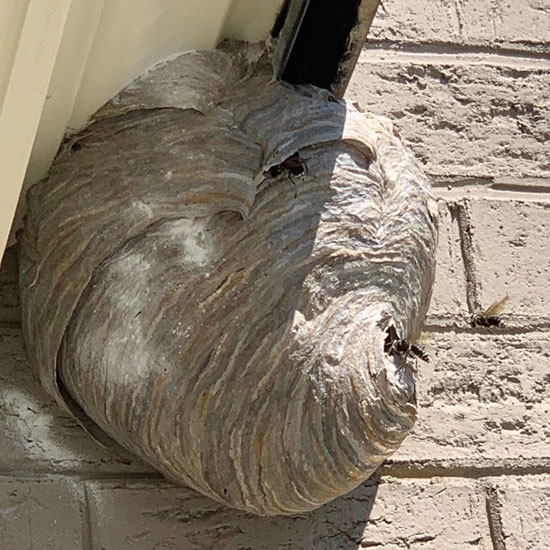Wasps
A Guide to Wasps
From Baltimore, MD’s Premier Pest Control Experts
Carnivorous, aggressive, and equipped to sting multiple times, wasps are one of the worst types of insects to have nesting on your residential or commercial property. Though they are beneficial to the ecosystem because they help keep many insect populations in check, most wasp colonies nested near human property end up causing more harm than good. Therefore, they should be taken care of by pest professionals as quickly as possible. At All Star Pest Management, we offer comprehensive wasp pest control services for homes and businesses across the Baltimore and Columbia, MD area. Read on to learn more about wasps and be sure to contact our wasp control professionals today to schedule our effective pest control services. If you suspect a wasp infestation on your property, rely on our experts for professional advice and control techniques to keep wasps at bay!

Where Are Wasps’ Nests Usually Found?
Wasps may build their nests indoors or outdoors, though they generally prefer the outdoors even when hibernating during the winter. If they’ve found a way into your home or business through a damaged screen, open window, or via your attic, they may do damage to your wallboards or ceiling over time. Not to mention, many humans have an allergic reaction to the venom found in wasp stings. However, your home or business’ exterior eaves, soffits, and gutters are the likeliest places you’ll find aboveground wasp nests. Underground nests are usually found in fallen logs, under rocks, or along cracks in concrete or asphalt slabs (patios, driveways, or sidewalks). Wasps are attracted to flowers and plants, or if they’re looking for a source of food, they may be attracted to uncovered garbage cans or an abundance of insects on your property. Wasps typically don’t sting unless they’re disturbed or they feel threatened.
How Do I Know If I Have Wasps, Yellow Jackets, or Hornets?
Due to their size and coloring, wasps are often confused with bees. Wasps are insects that belong to the family Hymenoptera and suborder Apocrita and are neither bees nor ants. Like bees, some wasps serve pollination roles in the ecosystem, while others are predators (unlike bees). Wasps usually have two pairs of wings and a pinched waist, and they may vary in size and color. Like most bees and ants, the two most common types of wasps in Maryland, yellow jackets and hornets, are eusocial, meaning they live together in a nest with an egg-laying queen and non-reproducing workers.
The yellow jacket is the species of wasp that is most commonly mistaken for a bee. However, yellow jackets are skinnier and shinier than bees, and they’re also carnivorous.
Yellowjackets often build their nests in areas close to the ground or underground, though they may also nest in trees or roofs. Yellowjackets do not produce or store honey, and, unlike bees, they can sting multiple times without dying.
Hornets are the largest type of eusocial wasp and are known to nest near human developments. The hornet species most common in Maryland, the large yellow-and-chestnut-colored European hornet, has been known to eat both bees and other wasps. Two other large yellow jacket species commonly called hornets are the bald-faced hornet and aerial yellow jacket, both of which produce grey-white paper nests in trees, shrubs, or the eaves of houses.
Wasp Prevention Tips
If you’ve experienced the sting or bite of a wasp, chances are you don’t want a whole hive nesting near your home or business. Here are a few prevention tips you can use to keep your property wasp-free:
- Fill in holes and cracks in your yard to prevent ground-nesting
- Treat timber with anti-wasp chemicals
- Illuminate high-risk nesting areas with a permanent low-wattage light
- Ensure your outdoor garbage cans or recycling bins are tightly sealed
- Keep windows and doors shut
- Inspect your eaves, soffits, gutters, garage, shed, and garden area for nests
- If you see a small nest (smaller than a tennis ball), quickly knock it down
Professional Wasp Extermination at All Star Pest Management
Matured wasp nests can harbor several hundred wasps and should not be removed without the assistance of a professional. Trying to remove a wasps’ nest yourself could result in multiple stings and the possibility for anaphylactic shock, not to mention the risks associated with falling off a ladder if you’re trying to remove an aboveground nest. Our pest control team at All Star Pest Management offers Maryland wasp identification and comprehensive wasp removal services for homes and businesses in Baltimore, Columbia, and the surrounding region. Keep those on your property safe and sting-free with our highly-effective anti-wasp services. Call our team to learn more today!
